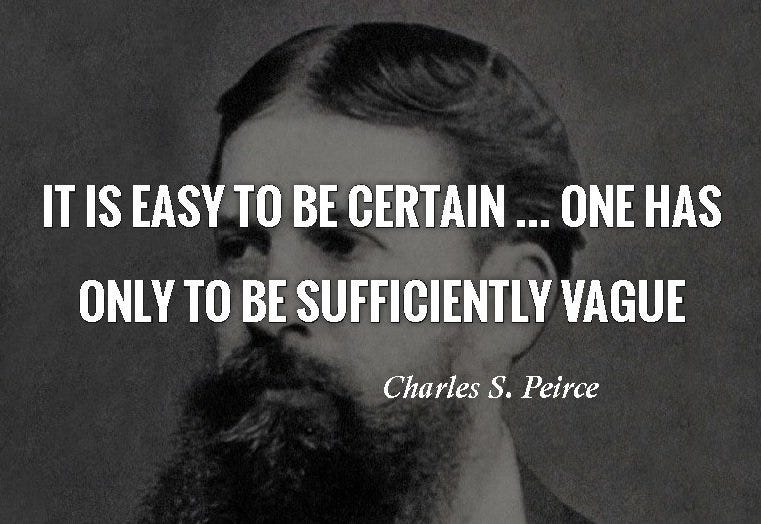The Degree of Epistemic (Dis)Parity Between Majority & Minority Eschatologies
Some distinguish logical defenses & evidential theodicies too neatly.
I, too, have said that I positively eschew the latter, while grateful for the former.
But isn’t that a tad at odds w/my fallibilist, holistic, axiological epistemology?
After all, my cumulative case stance gives more than a nod to our, more & less, shared moral intuitions, aesthetic sensibilities & common sense.
So, more rigorously, the epistemic divide’s not between analytic arguments, logically, & robustly probabilistic inferences, evidentially.
Our defenses are, rather, weakly probabilistic or plausible, merely abductive even.
Theodicies, though, make a pretense of interrupting, with inductive testing, what they might otherwise fear to be a nonvirtuous cycle of abductive hypothesizing & deductive clarifying?One telltale sign of theodicies is how their authors will – not only explain, but – even make predictions regarding realities that are (even to them, when they’re not being disingenuous or hyper-rationally specious) aesthetically repugnant, morally unintelligible & common sensically absurd.
In so doing, they can trivialize the enormity of human suffering & cursorily dismiss the immensity of human pain.
So, where has this consideration taken us?Perhaps onto familiar epistemic territory, where weaker arguments are easier to defend, where our stances have merely avoided any ostensible unreasonableness, where we formulate arguments without recourse to argumentation (cf Peirce re the Ens Necessarium), where our tautologies compete equiplausibly with others’?
But, not all tautologies are equally taut, n’est pas?We don’t navigate away from solopsism through argumentation or toward common sense notions of causation?
We employ the reductio ad absurdum in conjunction with our evaluative dispositions. We combine our gnoseological, cognitive mapmaking with the operative knowledge of our participatory imaginations, both which involve the radically social assists of our personal trust & love relationships, which can justify varying degrees of legitimacy to the manifold & multiform authorities in our lives.
Fast forward, there’s no denying God is in the dock. A process approach with an aesthetic teleology won’t get Him out any faster than the free will defenses of classical theists. What gets God out the dock for me has not boiled down to either case theories (defenses) or factual circumstances (theodicies).Using an analogy to criminal law, God should be sprung based on His character & hagiographic character witnesses. Those, alone, can ground a reasonable doubt independent of case theories & fact patterns. either case.
What matters to me is that my minoritarian mysterian appeal leaves intact at least a rudiment of my common sense, moral intuitions & aesthetic sensibilities. It asks me to believe they will be surpassed & fulfilled by a weight of glory – unimaginable.Contrast that with the majoritarian mysterian appeal, which asks me to believe that my epistemic suite – vis a vis my assessments of what are undeniably abject horrors – will have to be placed on the curb.
Are there no defensible distinctions to be drawn between remediable & irremediable horrors? Is there no clear disproportion?
Here’s another appeal: I’m a Daddy & a Grandpa. Jesus revealed His Daddy to me. WWJD?There’s an entire constellation of other theo-anthropo realities that support my indicative universalism and most of it draws on stances that are time-honored theologoumena.
I don’t ambition throwing over the majority position. I only aspire to advance an indicative universalism to theologoumenal status alongside the subjunctive as a valid minority opinion.
The better universalists can argue (properly conceding) the degree of epistemic parity between their own & competing eschatologies, the more defensible will be their claim that an indicative universalism should be granted theologoumenal status alongside the subjunctive.
Locating the Disproportionalities Between Purgation & Perdition
It doesn’t work to compare reality’s radically unintelligible transient & everlasting evils quantitatively. It’s not like we can relate them, algebraically, to conclude that multiplying absurdity by infinity doesn’t change a “damned” thing intelligibility-wise.
Finite transient & everlasting evils differ, rather, qualitatively per ir/remediability.
That’s what grounds the disproportionality of DBH ‘s moral modal collapse at the eschatological horizon as well as my cooperation with evil – double effect principle analogy.
That’s what makes our distinctions between divine antecedent & consequent wills and divine permission & intent dissolve, practically. That’s also what makes our distinction between a parasitic & substantial evil existence meaningless, practically.These disproportionalities are grounded, qualitatively, in absolute & categorical – not mere relative & quantitative – differences. That’s what makes purgation intelligible and perdition unintelligible, notwithstanding that evil, in & of itself, is otherwise utterly absurd.





